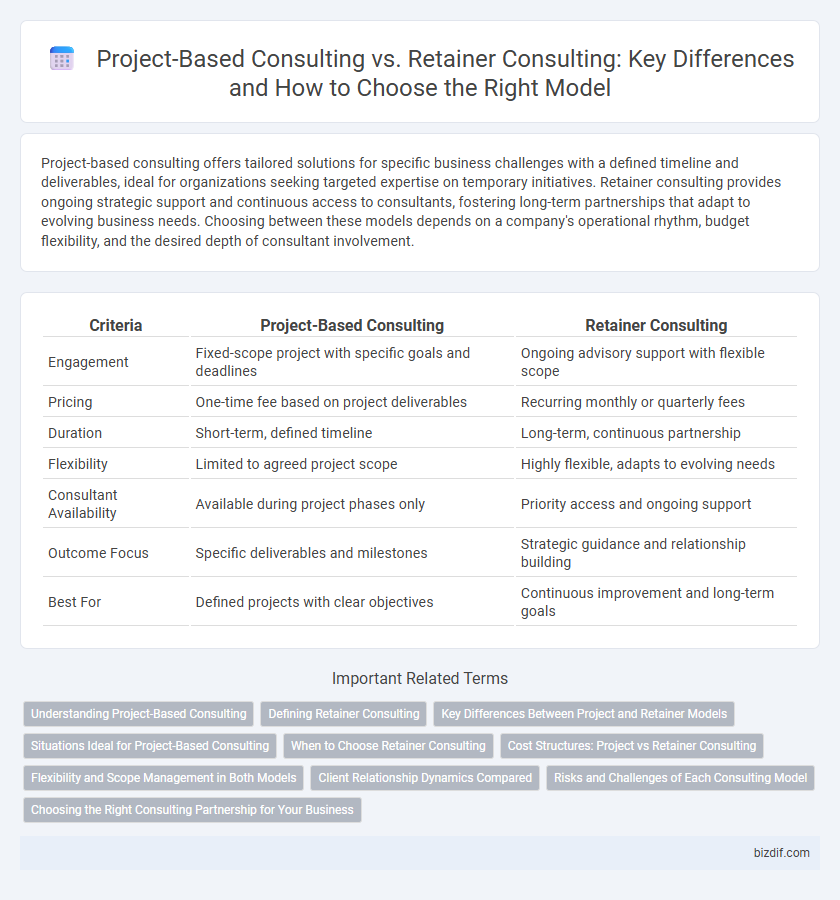Project-based consulting offers tailored solutions for specific business challenges with a defined timeline and deliverables, ideal for organizations seeking targeted expertise on temporary initiatives. Retainer consulting provides ongoing strategic support and continuous access to consultants, fostering long-term partnerships that adapt to evolving business needs. Choosing between these models depends on a company's operational rhythm, budget flexibility, and the desired depth of consultant involvement.
Table of Comparison
| Criteria | Project-Based Consulting | Retainer Consulting |
|---|---|---|
| Engagement | Fixed-scope project with specific goals and deadlines | Ongoing advisory support with flexible scope |
| Pricing | One-time fee based on project deliverables | Recurring monthly or quarterly fees |
| Duration | Short-term, defined timeline | Long-term, continuous partnership |
| Flexibility | Limited to agreed project scope | Highly flexible, adapts to evolving needs |
| Consultant Availability | Available during project phases only | Priority access and ongoing support |
| Outcome Focus | Specific deliverables and milestones | Strategic guidance and relationship building |
| Best For | Defined projects with clear objectives | Continuous improvement and long-term goals |
Understanding Project-Based Consulting
Project-based consulting delivers tailored solutions for specific business challenges, with clearly defined objectives, timelines, and budgets. This model enables companies to access expert advice for one-time initiatives such as system implementation, market analysis, or organizational restructuring. It emphasizes measurable outcomes and efficient resource allocation, making it ideal for businesses seeking targeted impact without long-term commitments.
Defining Retainer Consulting
Retainer consulting involves an ongoing, long-term partnership where clients pay a fixed fee for continuous access to expert advice and services. This model prioritizes proactive strategic planning, rapid issue resolution, and sustained business growth support. Retainer agreements often include regular check-ins, performance monitoring, and customized solutions tailored to evolving organizational needs.
Key Differences Between Project and Retainer Models
Project-based consulting involves delivering specific, time-bound outcomes with predefined scopes and budgets, ideal for companies seeking targeted solutions or discrete business challenges. Retainer consulting offers ongoing advisory support through continuous engagement, enabling businesses to access expert guidance, strategic planning, and adaptability over time. Key differences include billing structure, flexibility in service delivery, and relationship duration, where project models emphasize fixed deliverables and costs, while retainer models prioritize sustained collaboration and evolving needs.
Situations Ideal for Project-Based Consulting
Project-based consulting suits businesses seeking specialized expertise for defined deliverables, such as launching a new product or implementing a technology system. This approach provides clear timelines and budgets, making it ideal for companies with specific, short-term needs. Organizations undergoing discrete organizational changes or one-time strategic initiatives benefit most from project-based consulting engagements.
When to Choose Retainer Consulting
Retainer consulting is ideal for businesses seeking continuous expert guidance and proactive problem-solving beyond isolated projects. It offers consistent access to specialized knowledge, enabling quicker decision-making and ongoing strategic alignment. Companies aiming for long-term partnerships and adaptive support often benefit from the predictable budget and deeper consultant-client collaboration that retainers provide.
Cost Structures: Project vs Retainer Consulting
Project-based consulting typically involves a fixed cost determined by the scope and deliverables, offering clear budget control and predictable expenses for specific initiatives. Retainer consulting features a recurring fee, providing ongoing access to expertise and continuous support, which can be more cost-effective for long-term, evolving business needs. Understanding these cost structures helps businesses align consulting investments with project timelines and resource demands.
Flexibility and Scope Management in Both Models
Project-based consulting offers high flexibility by defining clear deliverables and timelines, allowing precise scope control and budget management for specific objectives. Retainer consulting provides ongoing support with adaptable scope adjustments to meet evolving client needs, ensuring continuous collaboration and strategic alignment. Both models require effective communication and scope management tools to maintain project focus and client satisfaction.
Client Relationship Dynamics Compared
Project-based consulting often results in transactional client relationships centered around specific deliverables with defined timelines, emphasizing immediate problem-solving and measurable outcomes. Retainer consulting fosters ongoing, strategic partnerships where consultants provide continuous support, adapt to evolving client needs, and build long-term trust. This dynamic shift enhances collaboration, deepens understanding of client goals, and promotes proactive innovation in business solutions.
Risks and Challenges of Each Consulting Model
Project-based consulting carries risks such as scope creep, budget overruns, and unclear deliverables that can hinder project success and client satisfaction. Retainer consulting challenges include maintaining consistent value delivery, potential client dependency, and fluctuating workload that may affect resource allocation and profitability. Both models demand clear communication and well-defined expectations to mitigate misunderstandings and ensure project alignment with client goals.
Choosing the Right Consulting Partnership for Your Business
Selecting the ideal consulting partnership depends on your business goals and budget, with project-based consulting offering targeted expertise for specific initiatives and retainer consulting providing ongoing support and strategic guidance. Project-based consulting is optimal for businesses needing expert solutions on discrete tasks or short-term projects, delivering flexibility and clear deliverables. Retainer consulting suits organizations seeking continuous advice, long-term collaboration, and consistent access to consultants to navigate complex challenges and adapt to evolving market conditions.
Project-Based Consulting vs Retainer Consulting Infographic

 bizdif.com
bizdif.com